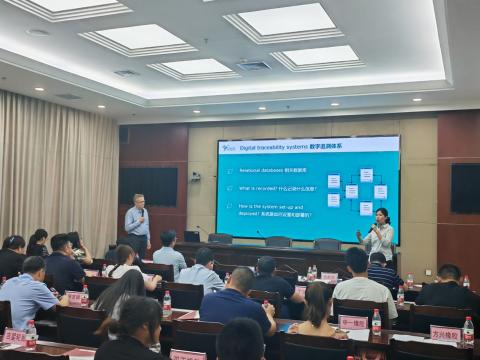New open-source framework enhances rubber traceability for sustainable supply chains
Today, the call for traceability in the supply chain has become more than just a buzzword – it is a necessity. With increasing consumer demand for transparency and sustainability and the recent influence of the EU Deforestation Regulation (EUDR), two Ivory Coast-based organisations turned to Preferred by Nature to craft an open-source framework for rubber traceability.
Preferred by Nature, in collaboration with SIPH (Société Internationale de Plantations d'Hévéas) and the Socfin Group, has developed the ‘Traceability Framework for natural rubber from smallholder plantations’. Focusing on rubber millers’ activities, this framework aims to enhance transparency and compliance in the natural rubber sector, whether in Ivory Coast, where natural rubber production is booming, or in other producing countries.
The consumption of natural rubber is closely linked to the development of the automotive industry and tyre production. This vast consumption is driven by growth in many emerging markets across Africa, including China and India.
Leveraging our experience in improving traceability across supply chains, particularly via our due diligence tools development for the LIFE Legal Wood Project and our Sourcing Hub, Preferred by Nature was well-equipped to support SIPH & Socfin Group putting up together such an open-source framework.
The framework was developed from May to June 2023 by Preferred by Nature experts, with input from SIPH and the Socfin Group’s experience. It was tested onsite in real producing conditions mid-November.
EUDR & the need for supply chain traceability
The demand for traceability in the supply chain has been further fueled by the EUDR, which requires organisations selling certain commodities, including natural rubber, in the European market to demonstrate that their production has not led to deforestation or forest degradation. This regulation mandates the precise geo-identification of plantations contributing to the production of raw materials by 2025.
To comply with the EUDR, companies need a robust traceability system that can track the journey of natural rubber from smallholder plantations and through processing mills.
The newly developed framework is a roadmap for primary natural rubber processing plants. It provides a clear picture of what a robust system for identifying and tracking raw materials from smallholder plantations looks like. It equips millers with clear indicators to control smallholder supply bases, nailing down the precise geolocation of all rubber plantations, monitoring natural rubber volumes and transactions, and implementing batch monitoring at the mill from reception to packing.
However, It is flexible enough to accommodate different practical solutions and tools to comply with indicators, thus enabling millers adopting this framework to gain a competitive edge by ensuring their ability to comply with the EUDR.
Free for all and adaptable globally
For rubber to continue accessing European markets, it will be essential for the industry to demonstrate that its production has not led to deforestation or forest degradation. This necessitates a robust traceability system down to the farm level.
Recognising that making a real impact in sustainability requires the effort of more than one party, SIPH and Socfin Group have decided to make this framework open source. This ensures accessibility for all stakeholders in the natural rubber sector, fostering collaboration and widespread adoption. Due to the nature of the framework, it is adaptable to be used across any part of the world.
By adopting this framework, companies can demonstrate their commitment to sustainability and ensure that their natural rubber production does not contribute to deforestation or forest degradation.
>> Access the Traceability framework for natural rubber from smallholder plantations
Key framework elements
- Corporate traceability policy and procedures: Ensures clear and documented commitments, encompassing traceability from smallholder plantations, with detailed procedures for system implementation.
- Quality management: Establishes clear responsibilities, allocates sufficient resources, and regularly monitors and updates the traceability system for ongoing effectiveness.
- Digital tools: Promotes the use of suitable digital tools for collecting, storing and managing traceability information, with an emphasis on centralisation and adaptable software.
- Smallholder registration: Emphasises the importance of a documented registration procedure, unique identification for smallholders, and verified information collection.
- Registration of intermediate buyers: If applicable, it recommends a documented registration procedure for intermediaries, including unique identification and records of links between intermediaries and smallholders.
- Plantation mapping: Emphasises the need to geolocate individual rubber plantations through surveyed boundaries, with a documented mapping procedure, unique data storage, and clear association of geolocation data.
- Management of purchases and deliveries: Focuses on purchases and deliveries associated with a single constitution batch.
- Internal batch traceability: Advocates for digitally recorded unique batch identification numbers and, if necessary, a product segregation system based on raw material traceability.
- Downstream traceability: Highlights the importance of linking outgoing products to identified smallholders and sharing this information with buyers.
- Control and verification of data: Emphasises the need for data integrity verification measures, a documented quota-based verification system per plantation, and additional measures to mitigate the risk of raw material mixing, while stressing the importance of internal procedures for managing non-conformities.




